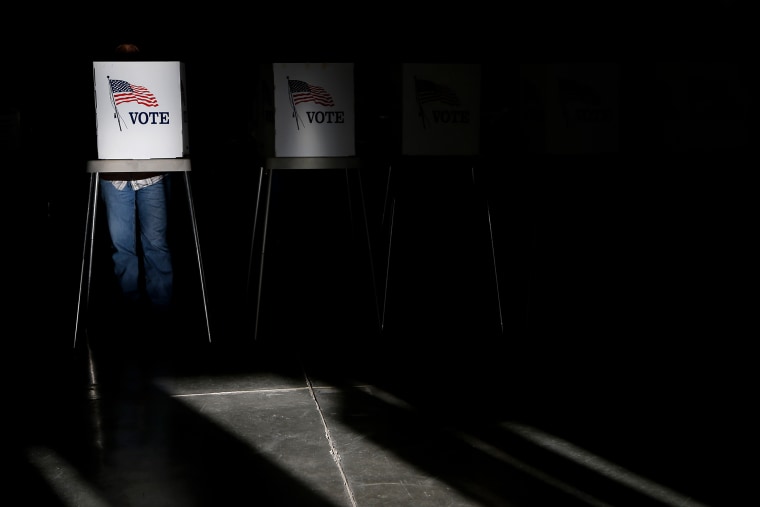When Hillary Clinton delivered pretty bold remarks on reforming the criminal-justice system, her Republican critics had very little to say. In fact, some probably agreed with her.
When Clinton delivered an equally ambitious speech on comprehensive immigration reform, her GOP detractors again had very little to say, probably because of the fear of a backlash.
But when the Democratic frontrunner endorsed a progressive vision on expanding voting rights and opportunities, and called out Republicans by name for needlessly imposing voting restrictions, the reaction was dramatically different. It's counter-intuitive -- criminal justice and immigration are, in theory, far more controversial than Americans being able to cast a ballot -- but here we are.
In separate interviews on Sunday news shows, former Texas Gov. Rick Perry, who is running for president, and New Jersey Gov. Chris Christie, who is considering it, said Mrs. Clinton is wrong. Mr. Perry said that the people of Texas support the state's requirements, and Mr. Christie said there are plenty of opportunities to vote in New Jersey.
On "Face the Nation," CBS's John Dickerson told Christie, for example, that Clinton has dismissed the idea of rampant voter fraud as baseless fear-mongering. "Well," the Republican governor replied, "she's never been to New Jersey, I guess."
I honestly don't know what this is supposed to mean. Does Christie see his home state as a cesspool for election fraud? If he has any proof of this, the governor has kept it well hidden. And if the governor actually believes his rhetoric, why hasn't his administration prosecuted these rampant cases?
And for that matter, why is it, exactly, that Christie believes automatic, universal voter registration will make this imaginary problem worse?
Around the same time, Perry told CNN, "I think we make it pretty easy in the state of Texas for people to vote."
Ohio Gov. John Kasich (R), meanwhile, accused Clinton of "dividing Americans" by endorsing expanded voting rights. I haven't a clue what this is supposed to mean, either.
I'm reminded of what Brian Beutler said at The New Republic on Friday: "Clinton's plan ... demands clarity from her opponents. She has proposed that every American, except those who opt out, be automatically registered to vote when they turn 18, and that every state offer at least 20 days' worth of early voting. Republicans can't easily oppose this -- and oppose it they must -- without being explicit about the fact that they want to keep the voting rolls as trim as possible."
The result is a dynamic in which Republicans are outraged by an ambitious Clinton proposal, for reasons they have not yet identified. Christie thinks voter fraud is a massive problem in New Jersey, which isn't true, and under the circumstances, isn't entirely relevant. Perry thinks the status quo in Texas is already great, which would come as news to the 600,000 people the Republican governor helped disenfranchise. Kasich is worried about being "divisive," as if expanded voting access is somehow inherently acrimonious.
Late last weke, Wisconsin Gov. Scott Walker (R), complained Clinton's plan "defies logic" -- he didn't say why -- and added, "Clinton's extreme views are far outside the mainstream," as if most of the country is hostile to expanded voting rights.
The result is a field of GOP presidential candidates that largely seems hostile towards making it easier for more Americans to participate in their own democracy. If their goal was to blast Clinton's proposal, rather than voting rights themselves, it's not working -- they're yet to raise a specific, substantive objection.
"What part of democracy are they afraid of?" Clinton asked on Thursday. It's a question Republicans are evidently unprepared to answer.
